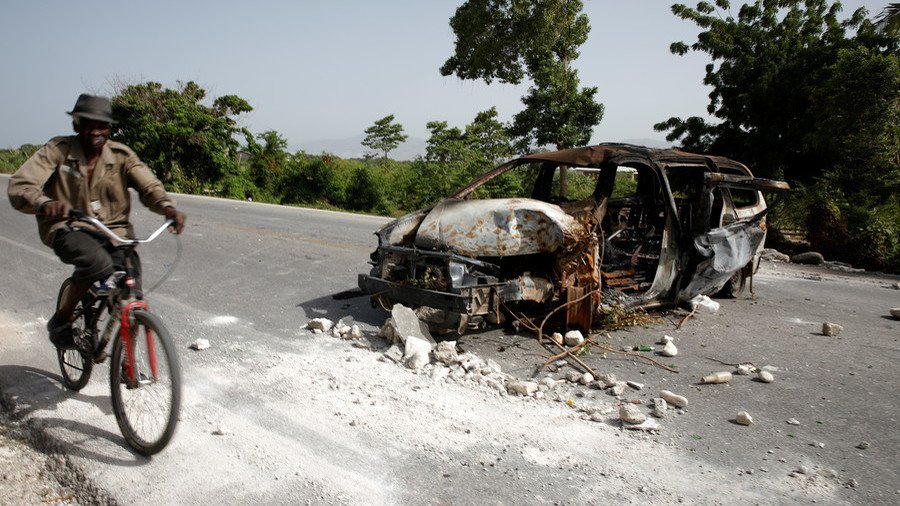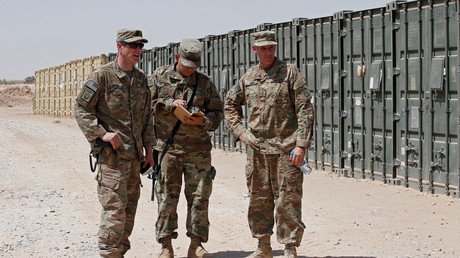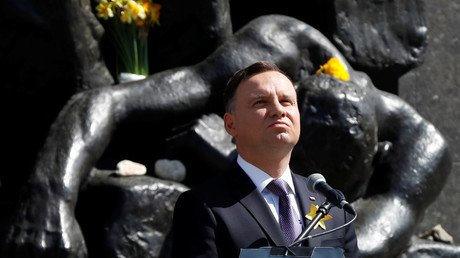Failed by the West: Haiti violence puts spotlight on years of aid abuse

American citizens have been warned to shelter in place as riots grip Haiti. The Caribbean country has yet to recover from a 2010 earthquake, with foreign aid coming with a side of disease and corruption.
The US State Department warned American citizens trapped in Haiti to hunker down and shelter in place on Sunday, “due to continuing demonstrations, roadblocks, and violence” in the capital of Port-au-Prince and beyond.
A collection of Christian youth groups remain stranded in the country, in rural areas away from Port-au-Prince. Some 120 Americans are believed to be trapped inside a hotel targeted by protesters, who attempted to burn the building down.
Haiti has been gripped by violent protests since Friday, when Prime Minister Jack Guy Lafontant announced fuel price hikes of 38 percent to balance the poverty-stricken country’s budget. While the government backtracked on the plan by Saturday, public anger has not abated, and government buildings, hotels, and business in the capital have been set ablaze.
Hotel Best Western in Petionville, #Haiti was set ablaze by anti-govt protesters moments ago. pic.twitter.com/xH4wQFwePx
— HaitiInfoProject 📡 (@HaitiInfoProj) July 7, 2018
At least four people have been killed amid widespread reports of looting, extortion, and arson. While AFP reports that some normalcy is returning to the streets, protesters are now calling for the departure of President Jovenel Moise, and have threatened a two-day general strike.
"If the president stays one more day, the game will take on a new appearance: we will cut off the roads and burn everything, because we have nothing else to lose," one protester told AFP.
All roads around the PAP, #Haiti airport now blocked by anti-govt protesters. pic.twitter.com/hsWbAvSeCd
— HaitiInfoProject 📡 (@HaitiInfoProj) July 7, 2018
Shaky recovery
In January 2010, a magnitude 7 earthquake with an epicenter 16 miles west of the capital leveled much of Haiti, killing anywhere between 100,000 and 316,000 people. Battered again by hurricanes Matthew and Irma in 2016 and 2017, as well as political unrest in 2015, Haitians are poor, hungry, and losing patience with their government.
When the earthquake hit, Haiti was already the poorest country in the western hemisphere, and the government was ill-equipped to deal with the cleanup operation. One year after the quake, only five percent of the rubble had been cleared, and only 15 percent of the required housing had been built. Eight years on, over two million Haitians are still dependent on humanitarian aid.
Millions of dollars in foreign aid largely bypassed the Haitian government, but money still found its way into the hands of the local elite - the part that did not fill the coffers of the NGOs, that is. Almost ninety percent of foreign funding was disbursed through UN agencies, private contractors, and foreign civilian and military agencies.
Even Haitian singer and rapper Wyclef Jean, who toured the world drumming up support for the relief effort, has been criminally investigated for the actions of his charity, Yele. The charity went out of business in 2012, and reportedly spent over half of the $16 million in donations it received on staff salaries, gifts to Jean’s family, and travel expenses such as flying actress Lindsay Lohan to a fundraising event in Chicago.
An epidemic of cholera that broke out in 2010 and did not subside until 2017 was blamed on contamination from UN peacekeepers.
Foreign aid has also supplanted the state as the biggest provider of services for Haitians, creating a culture of dependence. The US Institute of Peace once described Haiti as a “Republic of NGOs” and warned that if the government does not step up to better take care of its own citizens, the world’s first black republic will continue to lurch from one crisis to another.
How much money did the #ClintonFoundation and their dancing Hollywood meat puppets bilk from people to “help” Haiti back when? https://t.co/QtFMnta9nt
— James Woods (@RealJamesWoods) July 9, 2018
Clinton cash
Bill and Hillary Clinton’s eponymous Clinton Foundation made grand overtures in the aftermath of the 2010 quake, with Mr. Clinton being appointed UN Special Envoy to Haiti and co-chairman of the Interim Haiti Recovery Commission, alongside then Prime Minister Jean-Max Bellrive.
Despite the fact that the Clinton Foundation itself was only responsible for raising $30 million in recovery funds, critics in Haiti and in the US have accused the Clintons of using the disaster to peddle influence at the expense of poverty-stricken Haitians, and public anger against America’s former First Family runs high in Haiti and among the diaspora.
"The Clinton family, they are crooks, they are thieves, they are liars,” Haitian activist Dahoud Andre told the BBC. Kim Ives, editor of the Haiti Liberte newspaper, added that "a lot of Haitians are not big fans of the Clintons, that's for sure."
The Caracol Industrial Park project is a focal point of Haitian anger with the Clintons. Working with Hillary Clinton’s State Department, the foundation arranged a deal with the Haitian government to build a $300 million factory complex in 2012, that would supposedly provide 100,000 jobs. To date, the factory has created less than 10,000 jobs, and produces clothing mostly for Sae-A Trading Co, the South Korean textile corporation and Clinton Foundation donor. Factory bosses as recently as 2014 refused to abide by the government’s raising of the minimum wage.
Think your friends would be interested? Share this story!














